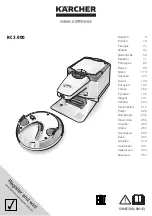
EMPTYING LIQUID WASTE FROM THE TANK
Use special care when emptying heavily loaded tanks. Your Wet/Dry Vacuum may be emptied of waste by removing the tank cover. To empty, stop
the motor and remove the plug from the wall receptacle. Remove the tank cover and deposit the liquid waste contents into a suitable drain. After
the tank is empty, return the cover to its original position. To continue use, plug the cord into the wall receptacle and start the motor.
WET PICK UP OPERATION
Remove ALL dirt and debris found in the tank. The vacuum requires only a minimum of conversion when going from dry to wet pick up. Wet pick
up requires the foam sleeve
(not standard on all models)
to be in position over the lid cage. Do not use the reusable dry filter
(not standard on
all models)
for wet pick up. Misting in exhaust air may occur if the foam sleeve becomes saturated during wet pick up. If misting occurs, remove
and dry the saturated foam sleeve or replace with another dry foam sleeve to eliminate the misting and possible dripping of liquid around the lid.
Turn the unit off immediately upon completing a wet pick up job or when tank is full and ready to be emptied. Raise the hose to drain any excess
liquid into the tank. The interior of the tank should be periodically cleaned.
The foam sleeve should be cleaned periodically as described in the following steps:
1. Always disconnect the plug from the wall receptacle before removing the tank cover. Place tank cover in an upside down position. Remove
foam sleeve by sliding it up and off the lid cage.
2. Shake excess dust off foam sleeve with a rapid up and down movement.
3. Hold foam sleeve under running water for a minute or two, rinsing from the inside. A water wash is not always required, depending on the
condition of the foam sleeve.
4. Gently wring out excess water, blot foam sleeve with a clean towel, and allow to dry. The foam sleeve is now ready to be reinstalled on the lid
cage.
NOTE: WET PICK UP ACCESSORIES SHOULD BE WASHED PERIODICALLY, ESPECIALLY AFTER PICKING UP WET, STICKY KITCHEN ACCIDENTS. THIS
CAN BE ACCOMPLISHED WITH A WARM SOLUTION OF SOAP AND WATER.
INSTALLING THE FILTER BAG •
NOT STANDARD ON ALL MODELS
1. Use for dry pick up only.
2. With cord disconnected from receptacle, pull latches in an outward motion and remove tank cover.
3. Unscrew hose locking-nut and remove hose from inlet
(Figure 30)
.
4. Remove inlet deflector from deflector guide
(Figure 31)
.
NOTE:
Hose must be removed before inlet deflector can be taken out.
5. With the opening of the inlet deflector facing the bottom of the filter bag, slide filter bag collar over deflector matching notches of bag
collar to tabs on inlet deflector, bag will only fit properly one way
(Figure 32)
.
6. Slide deflector with filter bag attached into deflector guide
(Figure 33)
.
7. Reinsert hose into inlet and tighten locking-nut
(Figure 34)
.
NOTE:
IF ACCIDENTALLY TIPPED OVER, THE VACUUM COULD LOSE SUCTION. IF THIS OCCURS, PLACE VAC IN UPRIGHT POSITION AND TURN
SWITCH OFF. THIS WILL ALLOW THE FLOAT TO RETURN TO ITS NORMAL POSITION, AND YOU WILL BE ABLE TO CONTINUE OPERATION.
AUTOMATIC SUCTION SHUT-OFF
The cleaner is equipped with an automatic shut-off that operates when picking up liquids. As the level of the liquid rises, an internal float rises
until it seats itself against a seal at the intake of the motor, shutting off suction. When this happens, the motor will develop a higher than
normal pitch noise. To continue use, empty the liquid waste from the tank as outlined in the previous paragraph.
23
24
25
26
27
29
28
30
31
32
33
34
LUBRICATION
No lubrication is necessary as the motor is equipped with lifetime lubricated bearings.
























